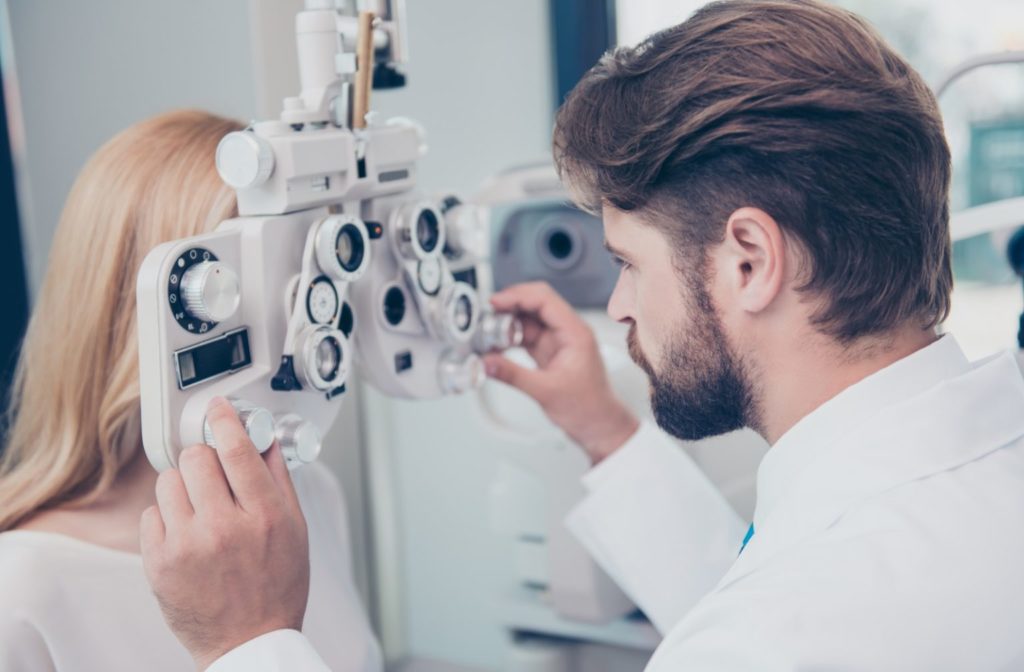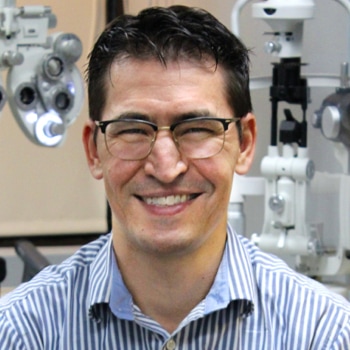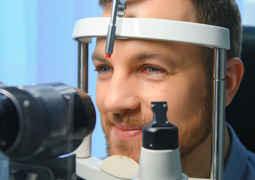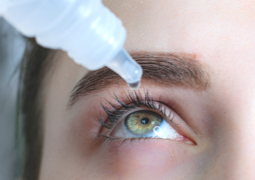Dealing with diabetes can be difficult and might leave you feeling overwhelmed. Early diagnosis and proper treatment can give you the power to manage your diabetes with confidence. There are many ways to diagnose diabetes early, including through regular eye exams.
Diabetes is the leading cause of blindness in Canada, so regular eye exams and proper care could be the difference between sight and total vision loss.
What is the Connection Between Diabetes & My Eyes?
High blood sugar can damage your retinas, making diabetes a main concern when it comes to eye health and clear vision.
Your retinas detect light and send signals to your brain through the optic nerve. Imagine your retina as a camera that takes pictures for your brain.
Anyone with type 1 diabetes, type 2 diabetes, or gestational diabetes is at risk for developing a diabetic eye condition. People with diabetes are also more susceptible to cataracts and glaucoma at a much younger age.
The longer you have diabetes, the higher your risk of developing vision issues.
Diabetic Retinopathy
Diabetic retinopathy can lead to partial or full vision loss if left untreated. In fact, more than half of people with diabetes develop diabetic retinopathy.
Diabetic retinopathy is characterized by high blood sugar that can damage the blood vessels in the retina. When these blood vessels are damaged, they begin to leak fluid or bleed. Your body will create new blood vessels, but these vessels are usually weak, further damaging your eyes.
Diabetic retinopathy may not show symptoms at first, but can be detected with dilation.
During dilation, your optometrist will put drops into your eye that dilate (widen) your pupils. This allows your optometrist to see your retina clearly. You’re unlikely to experience discomfort during the procedure, just light sensitivity.
Diabetic Macular Edema
Your macula is the part of the eye that allows you to read, drive, and see faces. Swelling in the macula can lead to a condition called diabetic macular edema (DME). This is usually a complication from developing diabetic retinopathy.
1 in 15 people with diabetes will develop DME. Untreated, DME can lead to partial or full vision loss as fluid leaks from blood vessels into the macula. Damage to the macula affects your central vision which can be permanent if not corrected.
Getting a Comprehensive Eye Exam
Comprehensive eye exams are performed by optometrists and ophthalmologists and provide a detailed overview of your eye health.
Before your exam, your optometrist should have your medical history. They should understand your vision needs in your day-to-day life, including your screen time, home and work environments, and recreational activities. Depending on your needs and concerns, the tests conducted during your exam may vary.
Generally, comprehensive eye exams involve:
- Measuring the visual acuity of your eyes without corrective lenses
- Binocular vision assessment for coordination, depth perception, & eye movements
- Eye health assessment using biomicroscope, ophthalmoscope, & dilation (if needed)
- Neurological assessment, including pupil reactions, ocular motility, & peripheral vision
- Diagnosis of refractive status/prescription
- Colour vision evaluation
- Glaucoma testing
Additional testing may be requested if your results from the initial exams need further clarification. These tests can include retinal photography, optic nerve or macular scans (OCT, GDx, HRT), contrast sensitivity, or other tests depending on what your optometrist recommends.
What Is a Screening Test?
Screening tests, or sight tests, can be performed by non-doctors and only measure the quality of your vision. Because the person performing your screening test likely isn’t trained or licensed to diagnose conditions or diseases, it’s best to get a comprehensive eye exam.
How Often Should I Get an Eye Exam?
You should get an eye exam at least every year.
If you notice changes in your vision, see your optometrist as soon as you can. While it may not be cause for concern, dealing with new symptoms early can protect your eyes from long-term damage.
Your optometrist may ask you to come in for additional eye exams if you’ve been diagnosed with diabetes.
Diagnosing Diabetes
Comprehensive eye exams can help detect diabetes early, sometimes before symptoms start. These exams can also indicate the need for lifestyle or diet changes, better compliance with treatment, or the need to update medications.
Using a high-powered microscope, your optometrist can examine the structures of your eye, including blood vessels and optic nerves. Your optometrist can look for irregularities in your eye that can point to conditions like diabetes.
When to See an Optometrist
We recommend booking an appointment with your optometrist right away if you experience any of the following symptoms:
- Blurred or distorted vision
- Frequently changing vision (different day to day)
- Dark areas in vision or vision loss
- Poor colour vision
- Floaters or flashes
Addressing these symptoms early can help prevent permanent damage to your eyes.
When to See a Doctor
You should see your general practitioner right away if you experience any of the following symptoms:
- Frequent urination
- Fatigue
- Sores that don’t heal
- Extreme hunger & thirst
- Blurry vision
These symptoms combined with vision issues could be a sign of diabetes. Your doctor may refer you to an optometrist, but it’s important to get your blood sugar under control first. Your doctor can prescribe medication to manage your blood sugar.
From there, any visual issues can be addressed with your optometrist.
Caring for Your Eyes
Managing your blood sugar, whether or not you have diabetes, is a key part in maintaining healthy eyes. High blood sugar can cause swelling and blockages in your blood vessels, resulting in damage to your eyes. Any changes in your vision should be addressed with an optometrist as soon as possible. Contact our team to book an appointment today, and ask any questions you may have regarding your eye health.





















